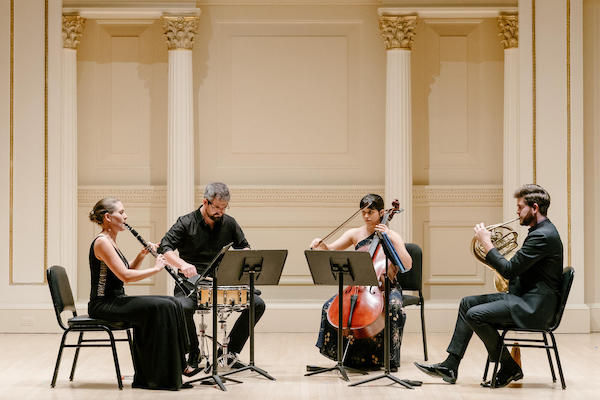A snare drum, horn and harpsichord enter the room for eclectic Ensemble Connect program

Ensemble Connect—the young professional training group that is a joint venture of Carnegie Hall and the Juilliard School—opened its season Monday night at Weill Recital Hall with typical polish. The atypical part was the eclectic program, which boasted some real chamber music rarities set against one of the most frequently played works in the repertoire.
One may never see a snare drum on stage for an evening of chamber music, but one was there for the opening piece, Bohuslav Martinů’s Quartet for Clarinet, Horn, Cello, and Snare Drum. On the surface, the instrumentation is eccentric, but it’s more indicative of Martinů’s personal stamp as a composer. His music is intelligent and suave, quirky in the way that someone might set off a classic and well-tailored suit with a surprising tie. This quartet is a fine example of that.
Clarinetist Yasmina Spielberg had the most prominent voice, playing with a strong, rounded tone and a jaunty flavor perfect for this post-L’Histoire du soldat score. The snare drum, played by Garrett Arney, marks out specific rhythms and also acts as a non-pitched echo of lines from the other instruments. At times, the cello of Laura Andrade and horn of Cort Roberts seemed to stroll off on their own paths, but the musicians were all listening to each other. In opening remarks, Roberts suggested the music is like a conversation, but it’s really like a group of flâneurs on their own coordinated strolls through a city—each finding different things to captivate them while sharing with the others, and the musicians brought that out.
Finishing the first half was Clara Schumann’s Piano Trio in G Minor. She was of course one of the great musicians of the 19th Century. Working with her husband Robert, with Brahms, and others, it is no exaggeration to say she shaped the course of the romantic era. The Piano Trio is an example of the frustrations of her compositions, how they show how little time and opportunity she had to write—it’s full of skill and energy, with some real personal characteristics and also some fine music that falls just short of sounding like her.
Andrade was joined by violinist Rubén Rengel and pianist Joanne Kang, and the three played the stylish opening movement with verve. Formally precise, the music has an exciting sense of instability, the melody falling forward but never landing, like a satellite in orbit. The middle movements and the finale, with a mix of rondo and fugue, are more rote, as if Schumann finished the form and structure but hadn’t the time to revise things fully to her liking. This is still a fine piece, and the playing was full of feeling.
Eleanor Albergo’s terrific String Quartet No. 2, opened the second half and was the high point of the concert. Composed in the mid-90s, the piece starts with an energetic, stabbing four-note phrase, and out of that comes the entire 15 minutes of music. It is ingeniously made, the core idea working equally well in both major and minor keys, and in both compressed and extended rhythmic form. The music has the energy of trying to force its way out of its own structures and harmonies, with an extended, dramatic coda.
Violinist Brian Hong and violist Halam Kim joined Rengel and Andrade for this excellent performance. It was easy to follow the core theme as it passed through voices and registers, and the playing sacrificed nothing to formal transparency. The musicians pushed intensely at the music, and held a feeling of excitement all the way through.
Last, and oldest, was Bach’s Brandenburg Concerto No. 5. The pleasure of hearing the familiar notes fall into place was buttressed by the small instrumentation: Rengel, Kang (at the harpsichord) , and flutist Amir Farsi were the solo group, and bassoonist Nik Hooks (in place of bass) joined the other string players for the continuo. One drawback was that the harpsichord had so little volume that it was often overwhelmed by even this small group, something of a shame because Kang’s first-movement cadenza was tremendous, fleet and fluid, the articulation pulling the listener along.
Overall, the concerto performance was solid, and Farsi in particular played with a beautiful sound and a personal sense of expression, if not always an idiomatic sense of style. Accents were a little smooth and rhythmic inflection was at a minimum. But never discount the crowd-pleasing quality of a Brandenburger.
Ensemble Connect plays music of Jennifer Higdon, Mozart, Michi Wiancko, and Robert Schumann, 7:30 p.m. Tuesday, February 21. carnegiehall.org